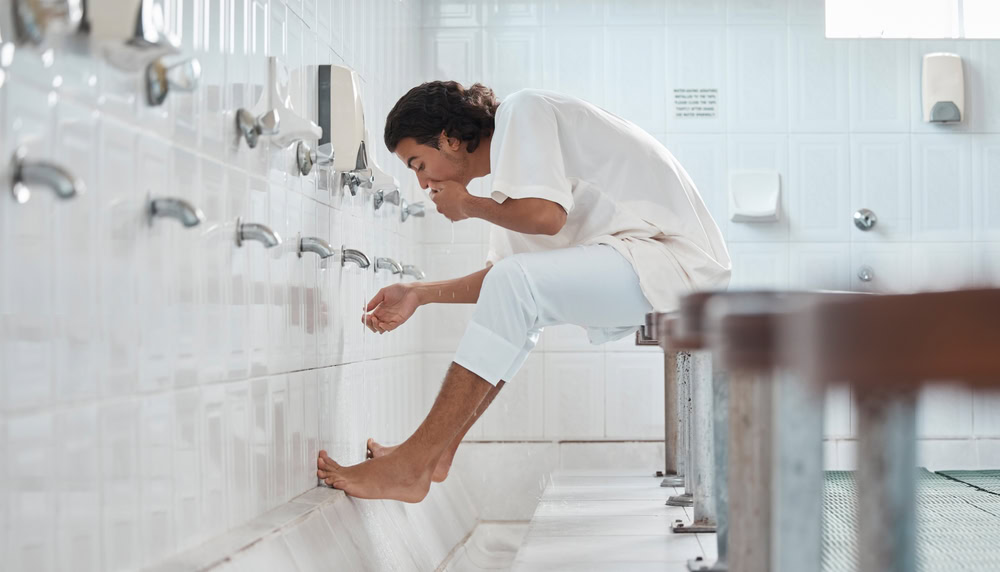What Is the Difference Between Major and Minor Impurities?
Shafi'i Fiqh
Answered By Shaykh Dr. Muhammad Fayez Awad
Question
What is the difference between minor impurity (al-hadath al-asghar) and major impurity (al-hadath al-akbar)?
Answer
In the name of Allah, the Most Gracious, the Most Merciful.
All praise is due to Allah, Lord of all worlds. Peace and blessings be upon the Messenger sent as a mercy to the worlds, our Master and Prophet, Muhammad, and his Family and Companions.
Definition of Impurity (Hadath)
“Impurity” (hadath) linguistically refers to something that has occurred or happened. In Islamic jurisprudence, it is an abstract state that affects the limbs and prevents the validity of prayer and similar acts of worship unless there is a valid concession.
Impurity is divided into two categories: minor impurity and major impurity.
Minor Impurity (Al-Hadath Al-Asghar)
This is an abstract state that affects four limbs of a person: the face, hands, head, and feet, preventing the validity of prayer and similar acts. This type of impurity is removed by performing wudu (ablution), after which a person is prepared to pray or perform similar acts of worship.
The causes of minor impurity include:
- Anything that exits from either of the two private parts (i.e., urine, feces, blood, or gas).
- Sleeping in a position that is not secure. A secure position is when one is seated with one’s posterior firmly on the ground; an insecure position is when there is any separation between the posterior and the ground.
- Loss of consciousness due to intoxication, fainting, illness, or madness.
- A man touching his wife or a non-mahram woman without a barrier. The non-mahram is any woman whom he is permitted to marry.
- Touching one’s private parts (or someone else’s), whether the front or back, with the palm of the hand or fingers without a barrier.
Major Impurity (Al-Hadath Al-Akbar)
This is an abstract state that affects the entire body, preventing the validity of prayer and similar acts of worship. It is removed by performing a full ritual bath (ghusl), after which a person is eligible to do what they were previously prevented from doing. [al-Fiqh al-Manhaji ‘ala Madhhab al-Imam al-Shafi‘i]
The causes of major impurity include:
One: Janaba
Janaba (ritual impurity due to sexual activity), which has two causes:
- The discharge of seminal fluid from a man or woman for any reason.
- Sexual intercourse, even if it does not result in the discharge of seminal fluid.
Two: Menstruation
Menstruation (hayd) is the blood that is a natural occurrence resulting from a healthy disposition, and it flows from the innermost part of the woman’s womb after she reaches puberty at certain known times.
A ritual bath (ghusl) becomes obligatory once the menstruation ends. The rulings of menstruation are detailed in the books of Islamic jurisprudence.
Three: Childbirth
Childbirth (wilada): This refers to the delivery of a child.
- Childbirth may occur without any accompanying blood discharge, in which case the ruling is similar to that of janaba.
- If the delivery of the child is followed by blood discharge—which is usually the case—it is known as postnatal bleeding (nifas), and a ritual bath (ghusl) becomes obligatory once the bleeding ends. [Ibid.]
May Allah make us among His beloved servants, as He says in the Quran:
“Surely Allah loves those who always turn to Him in repentance and those who purify themselves.” [Quran, 2:222]
All praise is for Allah, the Lord of all the worlds.
[Shaykh] Dr. Muhammad Fayez Awad
Shaykh Dr. Muhammad Fayez Awad, born in Damascus, Syria, in 1965, pursued his Islamic studies in the mosques and institutes of Damascus. A graduate of the Islamic University of Medina in 1985, he holds a Ph.D. in Islamic Studies from Bahauddin Zakariya University in Pakistan.
He has extensive experience developing curricula and enhancing the teaching of various academic courses, including conducting intensive courses. Shaykh Awad has taught Fiqh, Usul al-Fiqh, Quranic sciences, the history of legislation, inheritance laws, and more at several institutes and universities such as Al-Furqan Institute for Islamic Sciences and Majma‘ al-Fath al-Islami in Damascus.
He is a lecturer at the Sultan Muhammad al-Fatih Waqf University in Istanbul, teaching various Arabic and Islamic subjects, and teaches at numerous Islamic institutes in Istanbul. Shaykh Awad is a member of the Association of Syrian Scholars, a founding member of the Zayd bin Thabit Foundation, a member of the Syrian Scholars Association, and a member of the Academic Council at the Iman Center for Teaching the Sunna and Quran.
Among his teachers from whom he received Ijazat are his father, Shaykh Muhammad Muhiyiddin Awad, Shaykh Muhiyiddin al-Kurdi, Shaykh Muhammad Karim Rajih, Shaykh Usama al-Rifai, Shaykh Ayman Suwaid, Shaykh Ahmad al-Qalash, Shaykh Muhammad Awwama, and Shaykh Mamduh Junayd.
